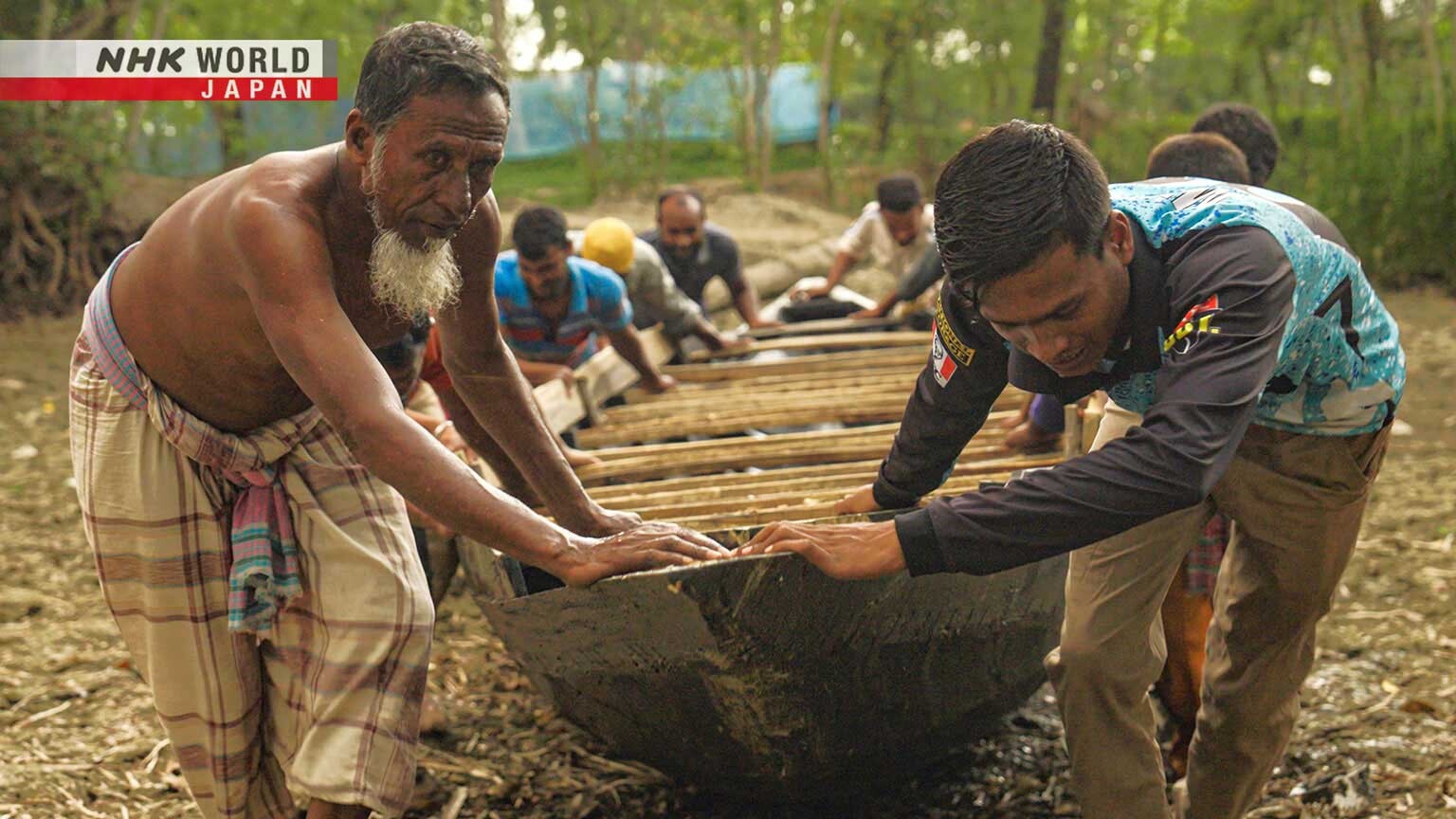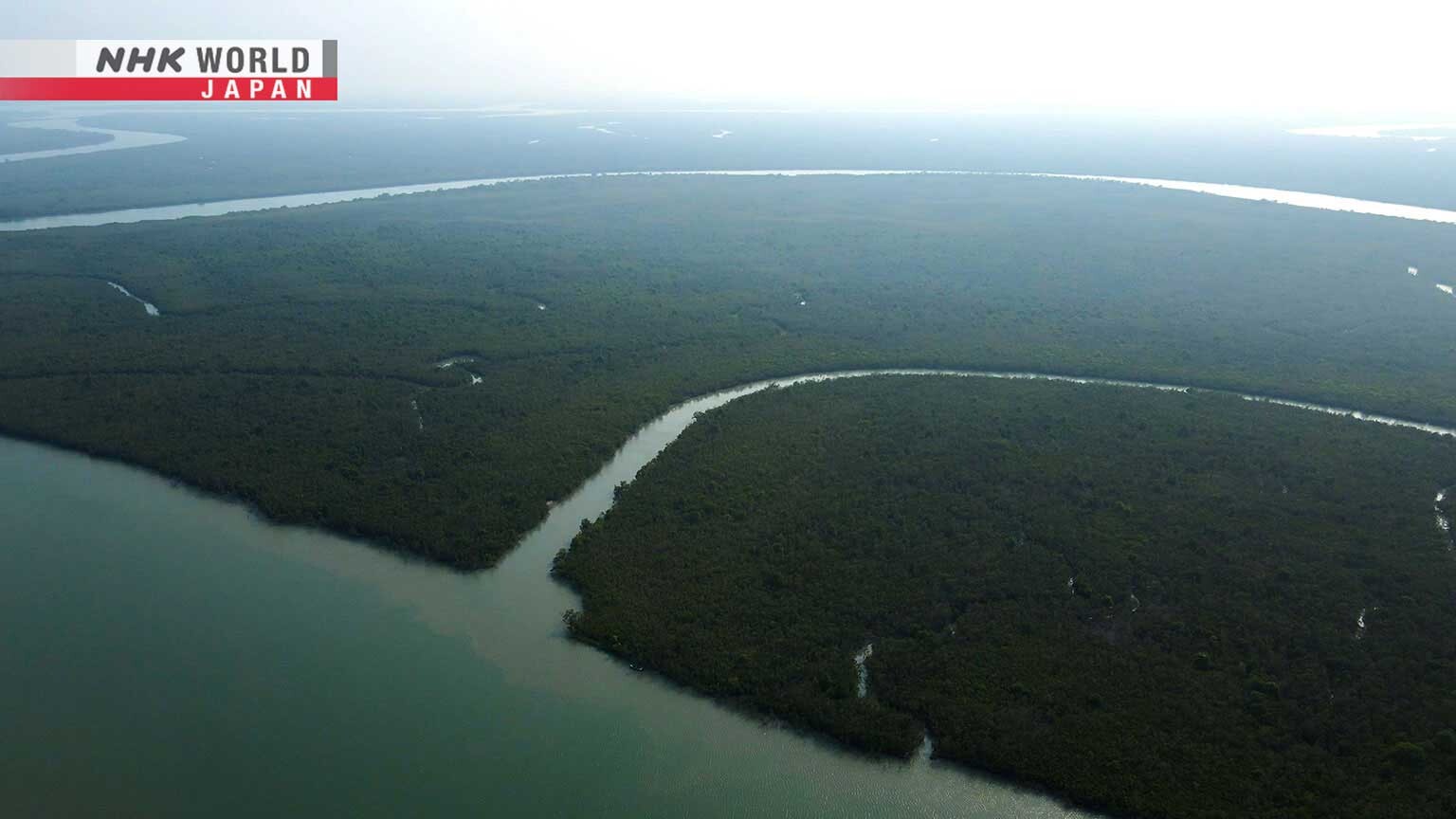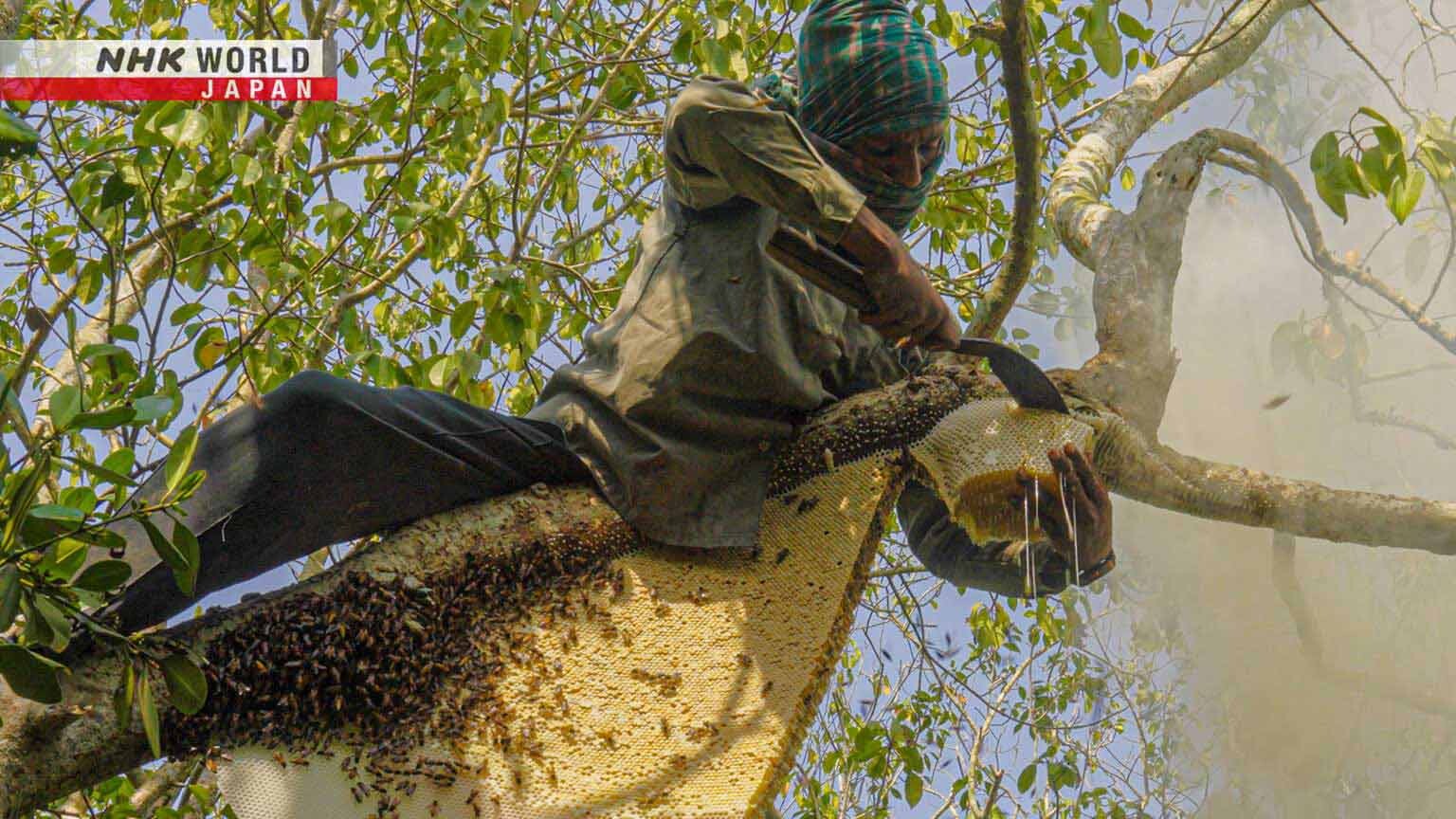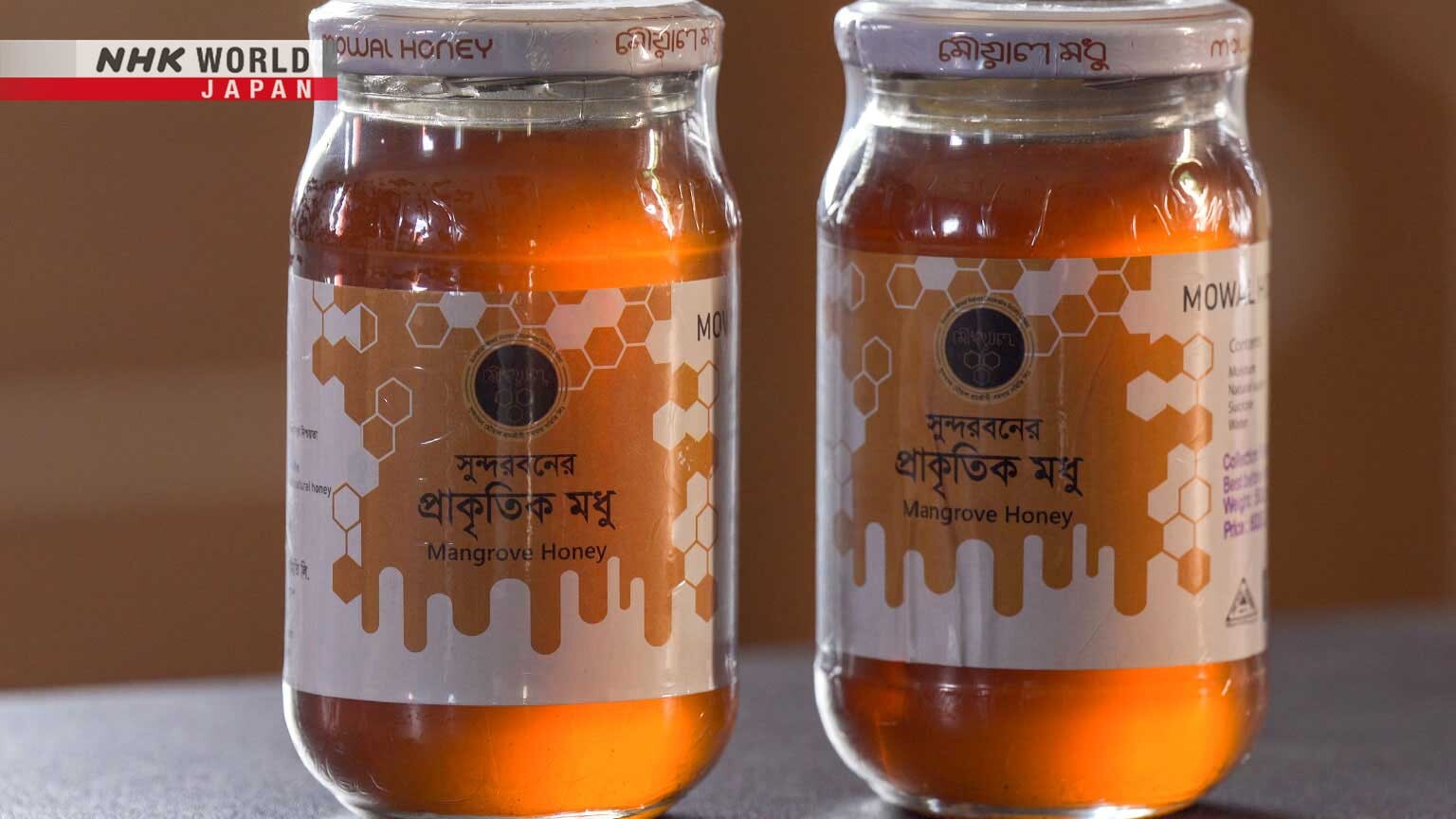The Honey Hunters of Bangladesh
For just two months every year, more than 1,000 men brave the dangers of the dense forest in order to hunt for wild honey, providing them the chance for an income where few other options exist.




Transcript
I've found it.
These are the forests of southern Bangladesh.
Let's go.
The men who gather honey from the hives of wild bees are known as honey hunters.
The honey they seek is valuable enough to justify their risky hunt.
Their honey is the best.
It's not just the sweetness, but the aroma and color that are great.
As urban development progresses in Bangladesh, the average income of city residents has steadily increased.
However, this prosperity has scarcely extended to rural regions.
To the people living there, honey hunting presents an essential source of income.
Honey hunting is the only work we have.
Without it, I couldn't support my family or put food on the table.
This program follows honey hunters armed with knowledge and skills carried down over the generations.
10 hours drive from the capital of Dhaka is a small village.
Mathurapur is located along Bangladesh's southwestern coastal region.
Due to the high salinity of the seawater-affected soil, the area is poorly suited to farming.
With no other industries to speak of, opportunities for direct income are few and far between.
In late March, the men of the village gather in preparation for their seasonal work.
200g of chili powder. 4 kg of onions. 1 kg of garlic.
Painkillers.
What's this?
We're listing out the supplies for honey hunting.
We set off in two days.
There's a lot of preparation.
Leading the group is Adam Ali Gazi.
He's made many honey hunting trips over the course of 4 decades.
Teams on the expedition consist of around 6 people.
The first step is readying a boat.
- What will you do now?
- Take the boat to the river.
Gazi rented the boat with borrowed money.
Put some strength in.
The boat allows them to travel directly to the most honey-rich areas.
Their hunting ground is the Sundarbans Reserve Forest.
As the world's largest mangrove forest, the area is recognized as a World Natural Heritage Site.
The honey hunting season is confined to April and May, when the mangroves are in bloom.
The tradition has been cherished for generations in the villages surrounding Sundarbans,
which are home to over 1,000 hunters.
Gazi does some fishing during the offseason, but it barely provides any income.
Their entire family depends on gathering honey.
Both Gazi's son and grandson have joined the hunt.
The three of them together make less than 2,000 US dollars a year,
allowing their family to eke out a living.
You aren't worried when they go out hunting?
It's in God's hands.
I always pray before they leave.
We need to make money for our families.
We have no choice but to hunt.
Shampoo.
Gazi purchases food and supplies for the men on his team.
This will be the first hunt of the season.
They plan for a 4-day excursion.
They bring several barrels of fresh water.
During their trip, they'll only have access to saltwater.
With daytime temperatures exceeding 40 degrees Celsius, water supplies are vital.
All of these goods are purchased with the borrowed money.
Whether they can repay it will hinge on the success of their hunt.
Last of all, Gazi visits the forest management bureau.
Entering the forest requires permission.
- How many of you?
- Six people.
Each member of their group needs approval to enter Sundarbans Forest.
This rule is strictly enforced to prevent overhunting and preserve the ecosystem.
The fee is 12 dollars per person for the season.
Naturally, Gazi pays it from the borrowed money as well.
There's one more reason that access to the forest is restricted.
It's the natural habitat of Bengal tigers.
A tiger attacked us as we were just walking through the forest.
The number of deaths in this region due to tiger attacks is said to be one of the highest in the world.
Although this man's shoulder was scratched by the huge feline, he escaped with his life.
That evening, the honey hunters gather in their boat.
Together, they pray for a safe journey, and that the hunt will be a successful one.
They set out on the morning of April 1st.
Gazi's wife Halima is there to see them off.
She applies oil to the bow of the boat as a charm to ward off misfortune.
We're off.
At last, they depart for the forest.
Their goal for the 4-day trip is to gather 60 kg of wild honey.
After leaving the village, they row their boat for six hours.
Gazi signals his team to go ashore.
Why did you stop here?
We find honey here every year.
Let's go.
Gazi knows the expanses of the vast forest like the back of his hand.
He relies on memory to return to the site of beehives he discovered in past years.
He's found something.
Sure enough, a beehive.
The hive is home to giant honey bees.
With bodies over 2cm long, the insects aggressively defend their territory.
The hunters get ready for battle.
They begin by rolling grass and leaves and lighting them aflame.
The smoke slows the bees' movements, making them less combative.
Drive away the bees!
Gazi's grandson Hakim swiftly cuts into the hive.
He aims to separate the section with the most honey.
He's able to skillfully cut it loose.
Thank God.
Hakim learned from his grandfather the importance of leaving half of the hive intact.
Leave the sections with eggs and larvae.
Then they'll rebuild their hive.
The honey will be replenished.
It's a good start.
I'll go catch some fish.
Gazi entrusts his team with the harvest, and heads toward a new task.
He fishes for their dinner.
This was all I could find.
A handful of small fish and shrimp.
We'll make curry with it.
This is the call to come together.
The team emerges from the forest.
They've gathered honey from 2 more hives.
Their total haul for the first day is around 5 kg of honey.
That night, they prepare potato curry with the seafood caught by Gazi.
How did you do today?
We didn't arrive until afternoon, so we haven't gotten much.
We should do better starting tomorrow morning.
They get ready to sleep on the boat.
With tigers and other nocturnal predators on the prowl, sleeping on land would be too perilous.
Drive off the mosquitoes.
The boat is a tight fit for 6 men lying down.
The group begins their hunt again as the sun rises.
Here we go!
The wetlands of the forest are a challenge to walk in.
Spiking up from the ground are mangrove roots.
Up there!
They find the beginning of a hive.
There's one here every year, but this year it isn't mature.
There's one.
Across the river.
No matter how rough the terrain, the men press ahead to ensure the success of their hunt.
High in a tree is a massive hive.
It's more than 1.5m long.
However, it's suspended 4m up in the air.
They prepare their approach.
It's Hakim who braves the climb to retrieve the hive.
It's really big.
Careful when you cut it.
God blessed us with this gift.
The bees fiercely swarm around him.
Don't waste a drop.
This way.
Hakim has suffered a number of stings.
Are you all right?
That must hurt.
I can put up with the pain.
Thanks to the large hive, they found three times as much as on their first day, around 15 kg.
During this season, many teams of honey hunters enter the forest.
Their strategies are diverse.
We leave at 2:00 AM and arrive early in the morning.
We get started right away.
These so-called "daily hunters" make single-day trips.
With inflation on the rise, many people have turned to honey hunting as a way to secure a quick source of income.
However, a number of them do so without obtaining permission.
Overhunting is caused by actions such as ripping out the entire hive,
fundamentally affecting the forest's ecosystem.
Traditional honey hunters like Gazi report that despite their best efforts,
they've seen diminishing returns in recent years.
They managed to gather 40 kg on this trip.
Far short of the 60 kg they had hoped for.
We looked all over, but couldn't find enough hives.
As the flowers bloom this season, there will be more.
They pin their hopes on future expeditions, and sample the fruits of their labor.
The season's first honey tastes great.
It's so good.
Delicious.
With this taste, their first hunt of the season comes to an end.
They begin the 6-hour journey home.
We're back.
Even after returning, their work isn't finished.
Could you come buy some honey?
After selling the honey and repaying their debt, they split the profits among the team.
The amount remaining for them is meager.
Dealers buy the honey we gather at awfully cheap rates.
We have no choice but to accept.
Most hunters fill reusable bottles with their honey in order to offer it to dealers.
The method invites further dishonesty by the resellers.
They dilute our honey with water.
Ours is pure honey, but theirs is fake.
While resellers turn a profit with inferior product, the hunters have been locked into poverty.
But now, this cycle is beginning to change.
Hello.
How did you do?
Well enough. Take a look.
These buyers are staff from an NGO called BEDS, which seeks to resolve poverty in Bangladesh.
And one way is by providing honey hunters with a better income.
Hakim, squeeze out the honey.
They extract the honey in front of the members of the NGO.
They do this in person to prove that the honey hasn't been diluted with things like water or sugar.
In addition to its purity, BEDS confirms that the honey comes from hygienic conditions.
The better the quality, the more they can pay for it.
We make sure it's clean.
It tastes great, so we want to take care that it stays that way.
The quality looks good.
BEDS agrees to buy a batch.
They pay 9 dollars per kg.
It's 20% more than the previous dealers had paid.
OK.
It sold at a good price.
This hunt has provided Gazi with enough income to get by for a month.
BEDS has a special reason for their generous rates.
The honey is filtered, heated, and processed so that it can be preserved long-term.
They then bottle it and have it distributed, establishing the brand as Sundarbans Honey.
The profits support higher incomes for the honey hunters.
They expect that the value of the local honey may increase in the future.
High-end brands like Manuka Honey sell for more than $300 per kg.
There's a lot to be improved before we can get there.
If we can manufacture to international standards, it'll be worth more.
Since Gazi started doing business with BEDS, his income has increased,
helping to gradually improve his daily life.
To earn as much as possible during the brief hunting season, he's already preparing for his next departure.
1 kg of garlic.
They have just one day off.
You're so busy.
I've been doing this for 40 years, now.
This time, Gazi decides to depart late at night.
The next day, they'll be able to get an early start on a fresh round of honey hunting.
We're off!
I just love going on the hunt.
It's been in my family for generations.
It's the best.
I'll keep doing this for the rest of my life.